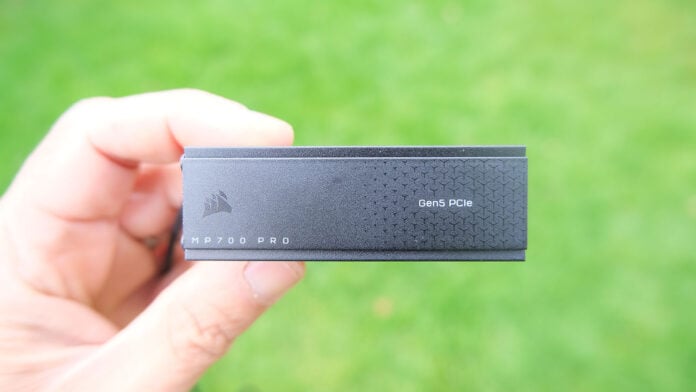PC platforms herald changes. Intel and AMD’s latest processors and many associated chipsets support PCIe 5.0 for graphics and storage. That’s enough reason for consumer SSD-makers to push out faster drives that comfortably breach the 10GB/s sequential read and write barrier. Leading the vanguard to ever-quicker speeds is controller manufacturer Phison whose E26 PCIe 5.0-compatible silicon is used by at least 15 manufacturers. Corsair is a name that features high on the list, so let me guide you through the range-topping MP700 Pro 2TB.
First, a step back. Like many, Corsair offers PCIe 5.0 goodness for regular and Pro flavours. Non-pro isn’t quite as fast – but hey, 9.5GB/s and 1.6m IOPS is hardly slow – and is available in 1TB and 2TB capacities. The enthusiast will veer towards the Pro, and with good reason… it’s a beast.
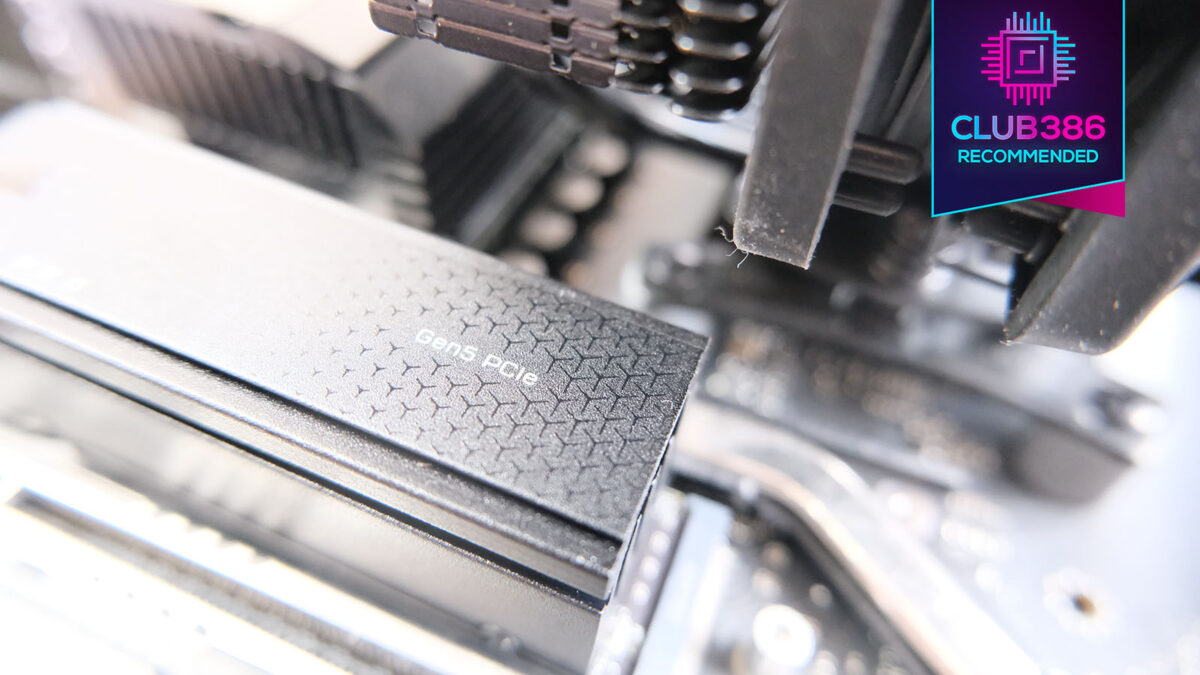
Corsair MP700 Pro 2TB
£300/ $320
Pros
- Electric performance
- Runs very cool
- Great design
- Up to 4TB capacity
- Five-year warranty
Cons
- There’s a fan
Club386 may earn an affiliate commission when you purchase products through links on our site.
How we test and review products.
Corsair offers plenty of choice, too. MP700 Pro is available in 1TB, 2TB, and 4TB capacities presented either as a bare M.2 2280 drive or with a pre-attached air cooler carrying a small fan. I’d only recommend the bare drive if your motherboard has exceptional M.2 cooling or you plan to invest in an aftermarket solution. You see, PCIe 5.0 SSDs run too hot to go without any explicit cooling. A bare drive is very much likely to thermally throttle and reduce peak performance accordingly, and you wouldn’t want that.
If you’re invested in the Corsair Hydro X ecosystem, there’s good news insofar MP700 Pro also ships with a compatible cooler in situ. For this model, Corsair eschews the 1TB offering in favour of 2TB and 4TB. That makes sense to me as anyone already big on custom loops is more of an enthusiast and tends to have deeper pockets for their hobby.
Specifications and Analysis
| Corsair MP700 Pro Air Cooler | 1TB | 2TB | 4TB |
|---|---|---|---|
| Controller | Phison E26 | Phison E26 | Phison E26 |
| NAND | 232L Micron TLC | 232L Micron TLC | 232L Micron TLC |
| DRAM | 2GB | 4GB | 8GB |
| Interface | PCIe 5.0 x4 | PCIe 5.0 x4 | PCIe 5.0 x4 |
| Sequential Read Speed (MBps) | 11,700 | 12,400 | 12,400 |
| Sequential Write Speed (MBps) | 9,500 | 11,800 | 11,800 |
| Random Read IOPS (K) | 1,400 | 1,500 | NA |
| Random Write IOPS (K) | 1,500 | 1,600 | NA |
| Form Factor | M.2 2280 | M.2 2280 | M.2 2280 |
| Endurance (TBW) | 700 | 1,400 | 3,000 |
| Hardware encryption | Yes | Yes | Yes |
| Heatsink version | Yes | Yes | Yes |
| Warranty | Five years | Five years | Five years |
| Current price | $180 / £190 | $300/ £320 | $575 / £590 |
Back to the MP700 Pro Air Cooler, the presence of Phison’s aforementioned E26 controller and Micron 232-layer TLC NAND is immediately familiar. Running down the high-level specs doesn’t unearth any great surprises. At the time of writing, value is certainly stronger in the US than over here in the UK. Corsair’s US webstore offer each capacity at a steeper discount, which is something I’d like to see replicated here. Nevertheless, the £320 asking fee for the review 2TB model is mostly in line with competitors such as the MSI Spatium M570 Pro and Crucial T700 HS.
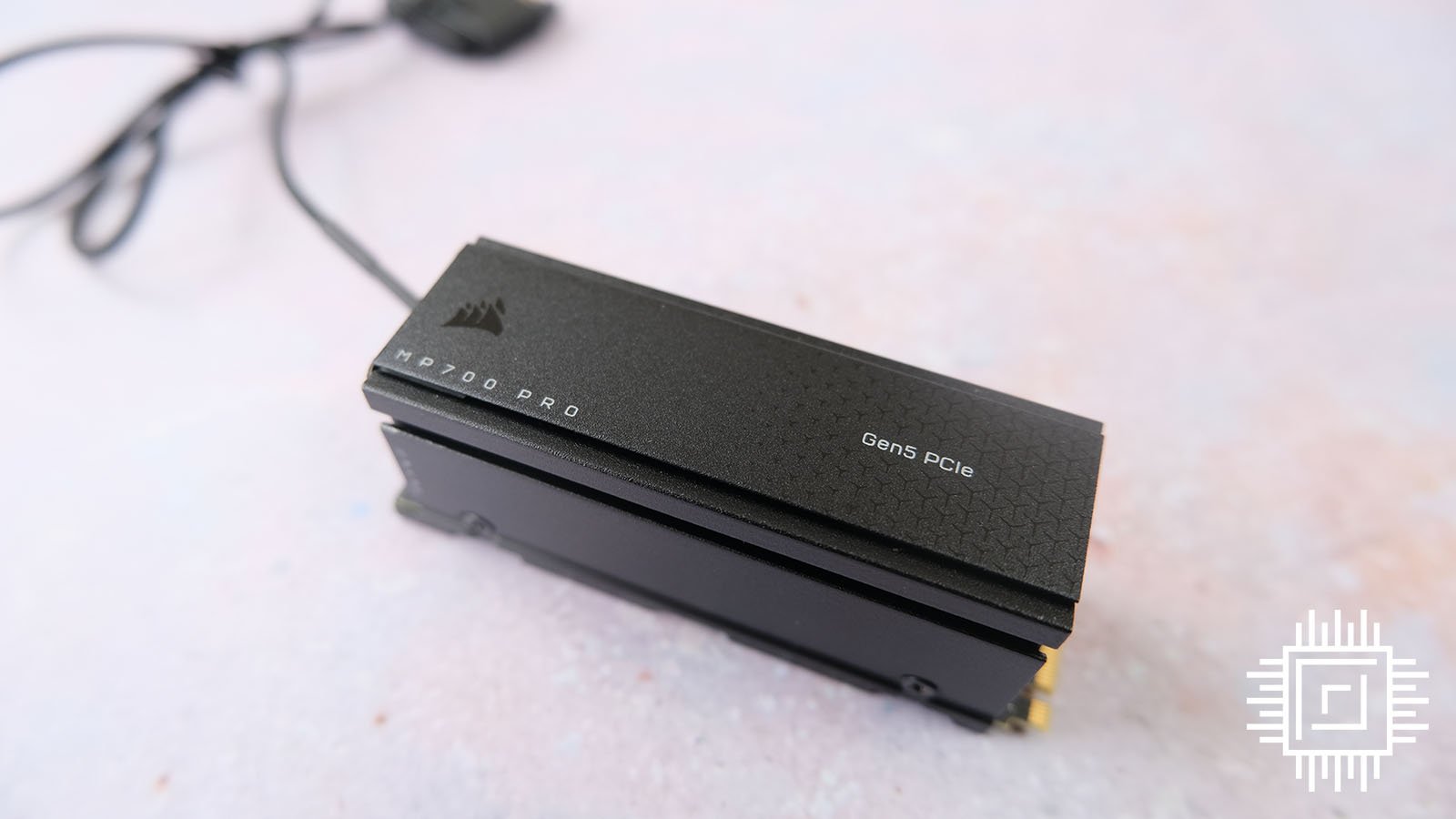
Think PCIe 5.0 M2, think oversize cooling. Corsair’s approach settles on actively cooling a mid-sized heatsink standing 30mm tall. Most enthusiast motherboard have ample space, and if you happen to install it near a graphics card or CPU air cooler, chances are the drive will receive indirect cooling.
Are you a fan?
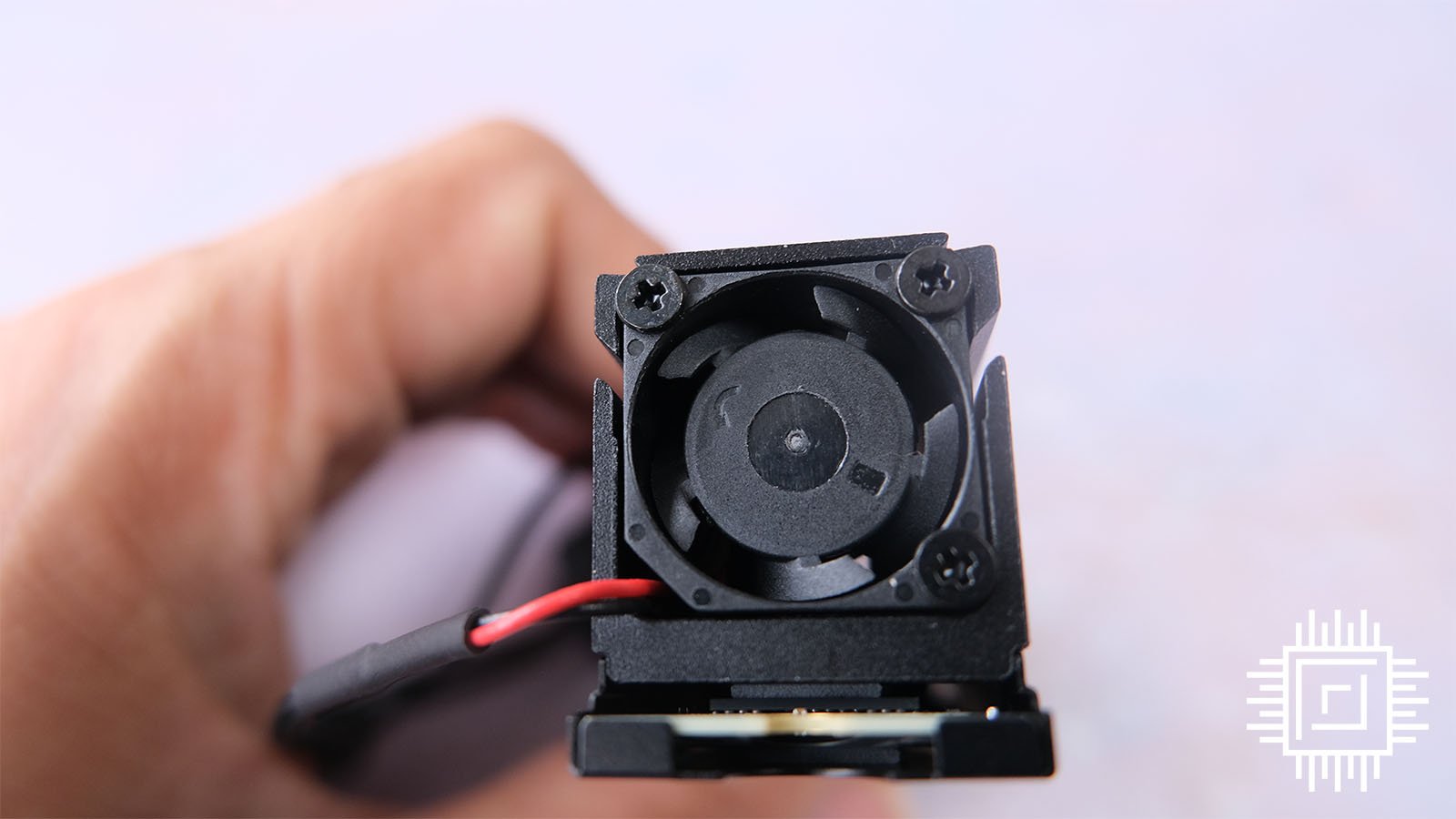
Taking no chances, however, Corsair slips in a 20mm fan whose job it is to push airflow through the heatsink and out the other side. Power is supplied by sleeved 45cm cable ending in a regular SATA connector. Looking somewhat ungainly no matter how you try to hide the cable, there’s no other way of easily providing juice to the fan. Your choice is between something like this and a much larger passively cooled solution like the MSI Frozr.
The fan is always on because there is no speed regulation. For Corsair, arguably a better solution is to modify the connector and attach it to a motherboard fan header with PWM control, thus enabling speed variation depending on load. Most of this commentary is moot as the fan is pretty quiet. I can’t hear it inside a well-ventilated chassis.
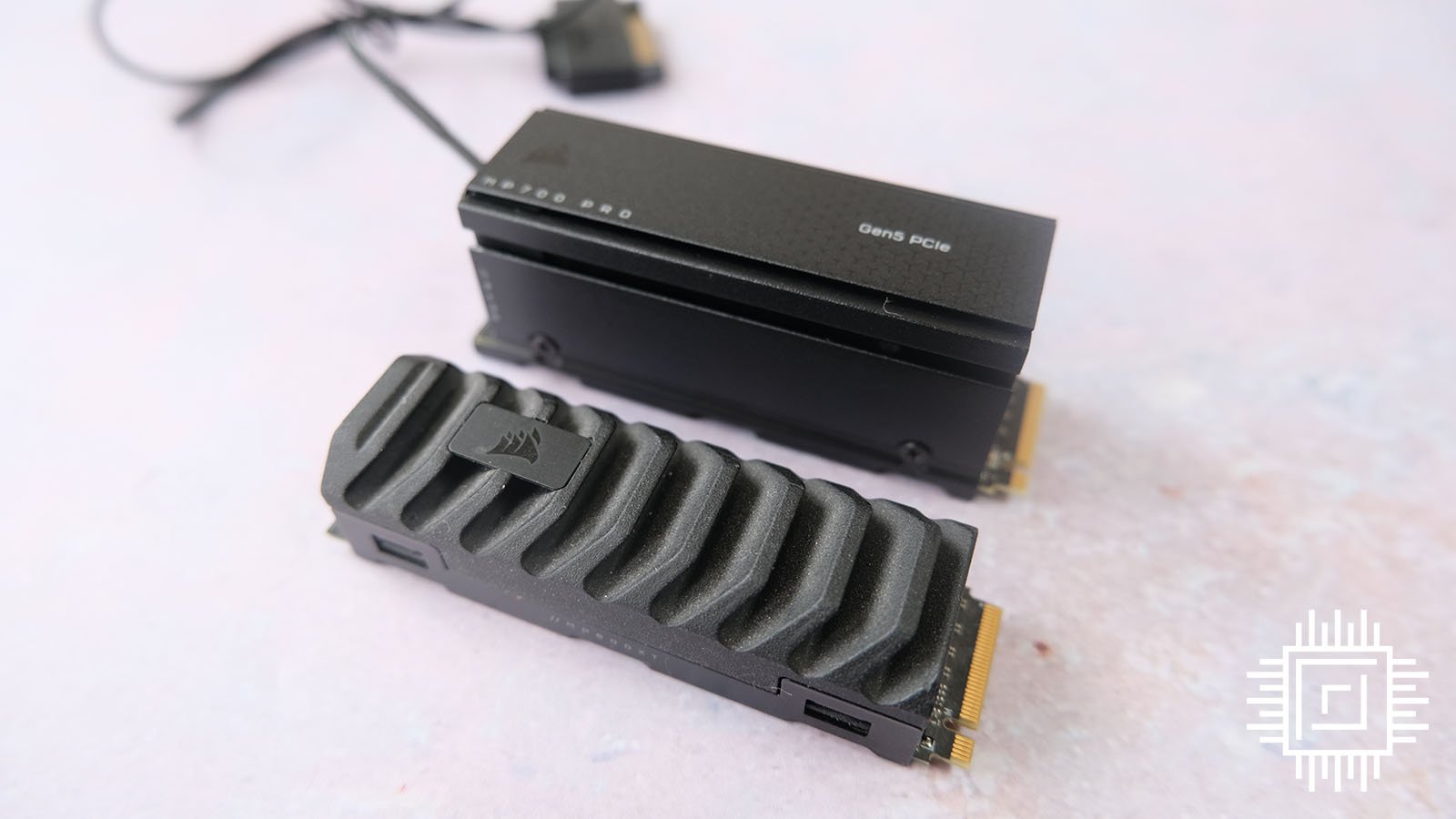
Bulking up like Arnie in the gym, physical differences between generations are stark. MP700 Pro hulks over last-generation MP600 Pro XT of the same capacity.
PCIe 5.0 M.2 drives aren’t therefore best suited to running as additional storage in, say, a PlayStation 5. Keep these bad boys for that high-end Intel or AMD PC build.
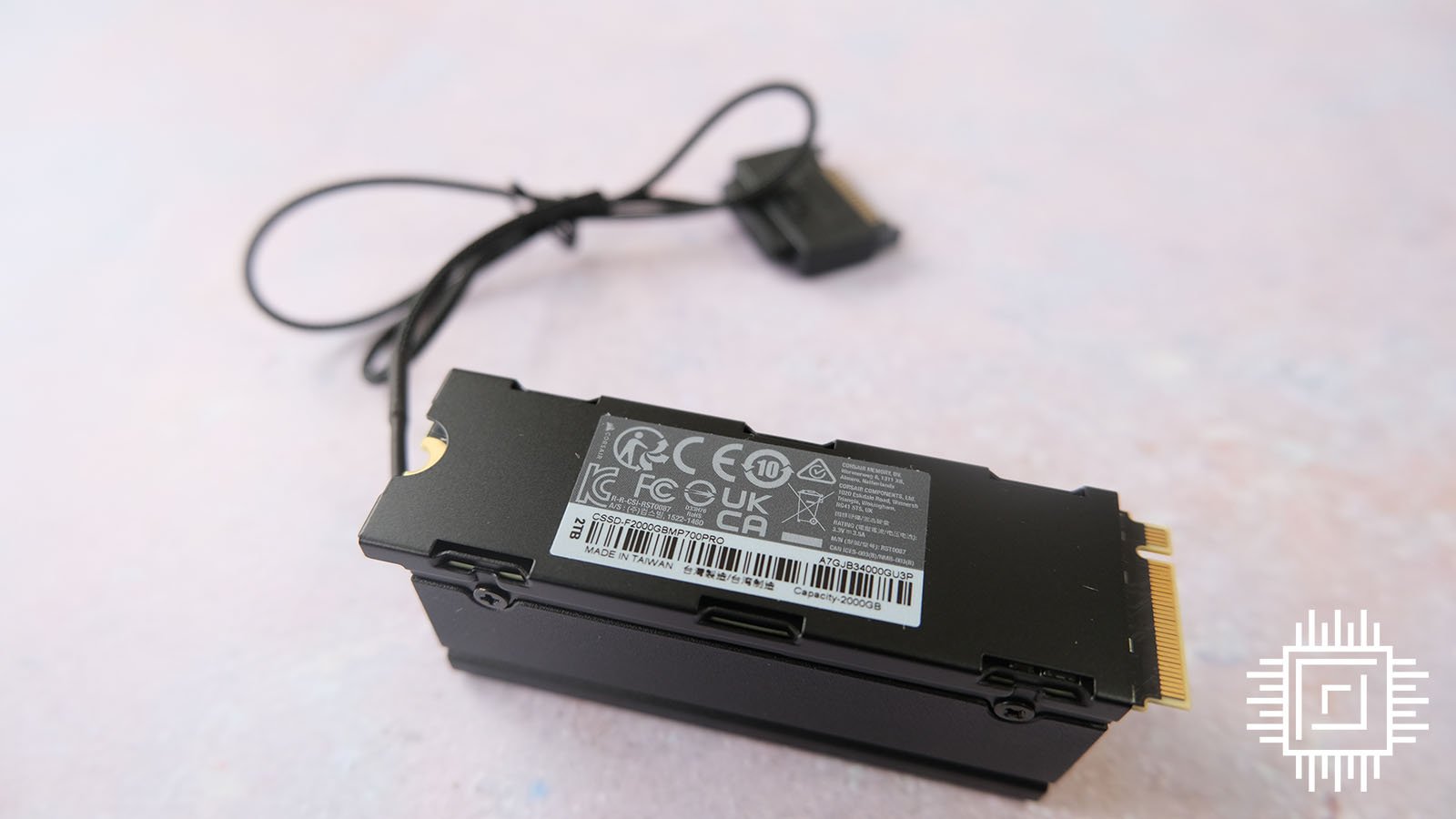
Corsair does a good job in ensuring a firm connection between the underlying PCB and heatsink. Removing four small screws gives access to the drive, but I heartily recommend against doing so. If you’re concerned about longevity for cutting-edge SSDs, feel more secure in the knowledge the MP700 Pro receives a five-year warranty.
For your reference and tech-heads out there, Phison’s E26 controller is flanked by 4GB of SK hynix DDR4-4266 memory for buffering duties alongside four Micron NAND chips carrying 512GB each. This is exactly the same setup as the MSI and Crucial PCIe 5.0 x4 M.2 2TB SSDs I’ve looked at recently.
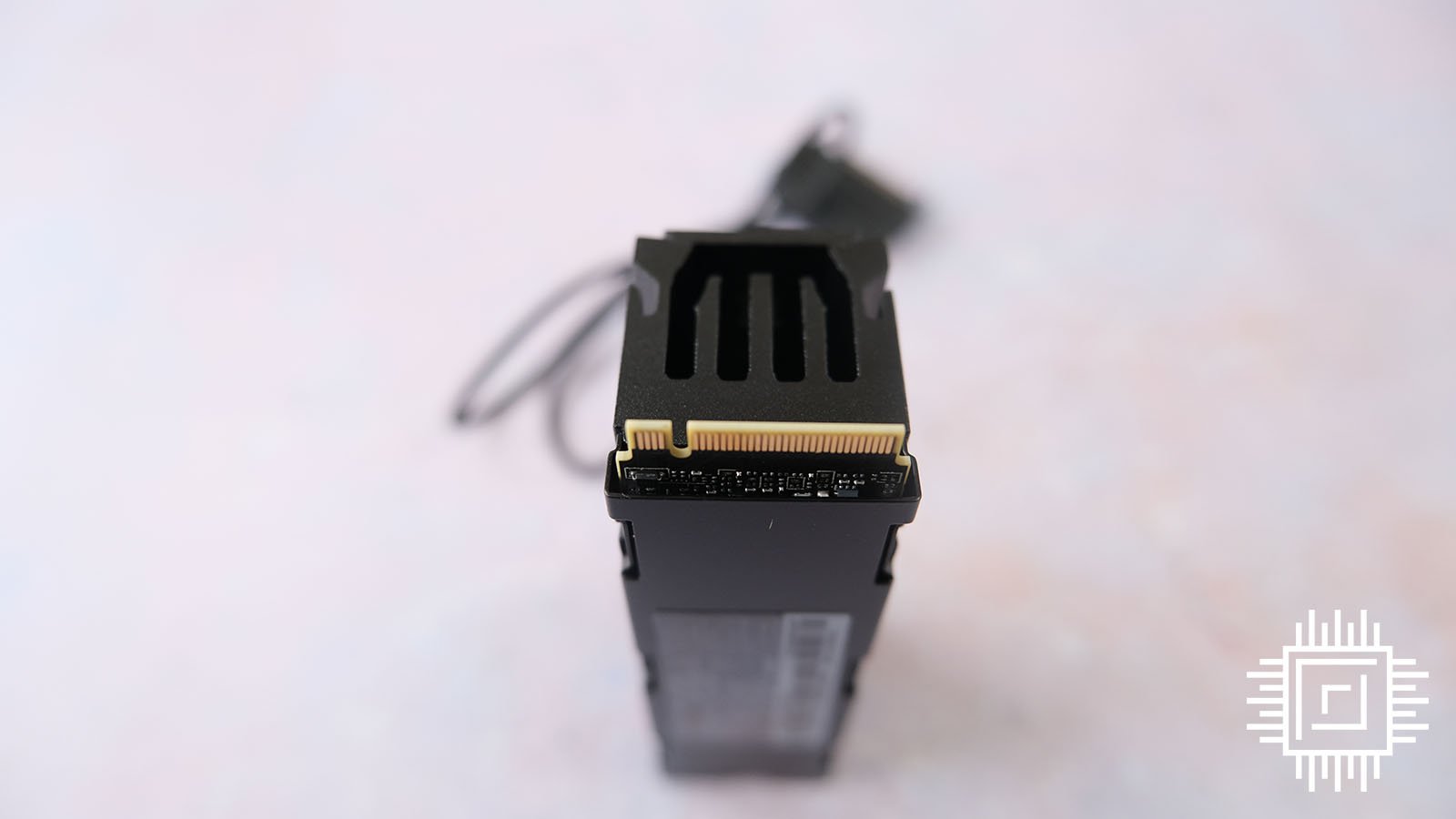
Tested on an ASRock X670E Taichi motherboard with firmwares updated to the latest, strap yourself in for some heady numbers.
Performance
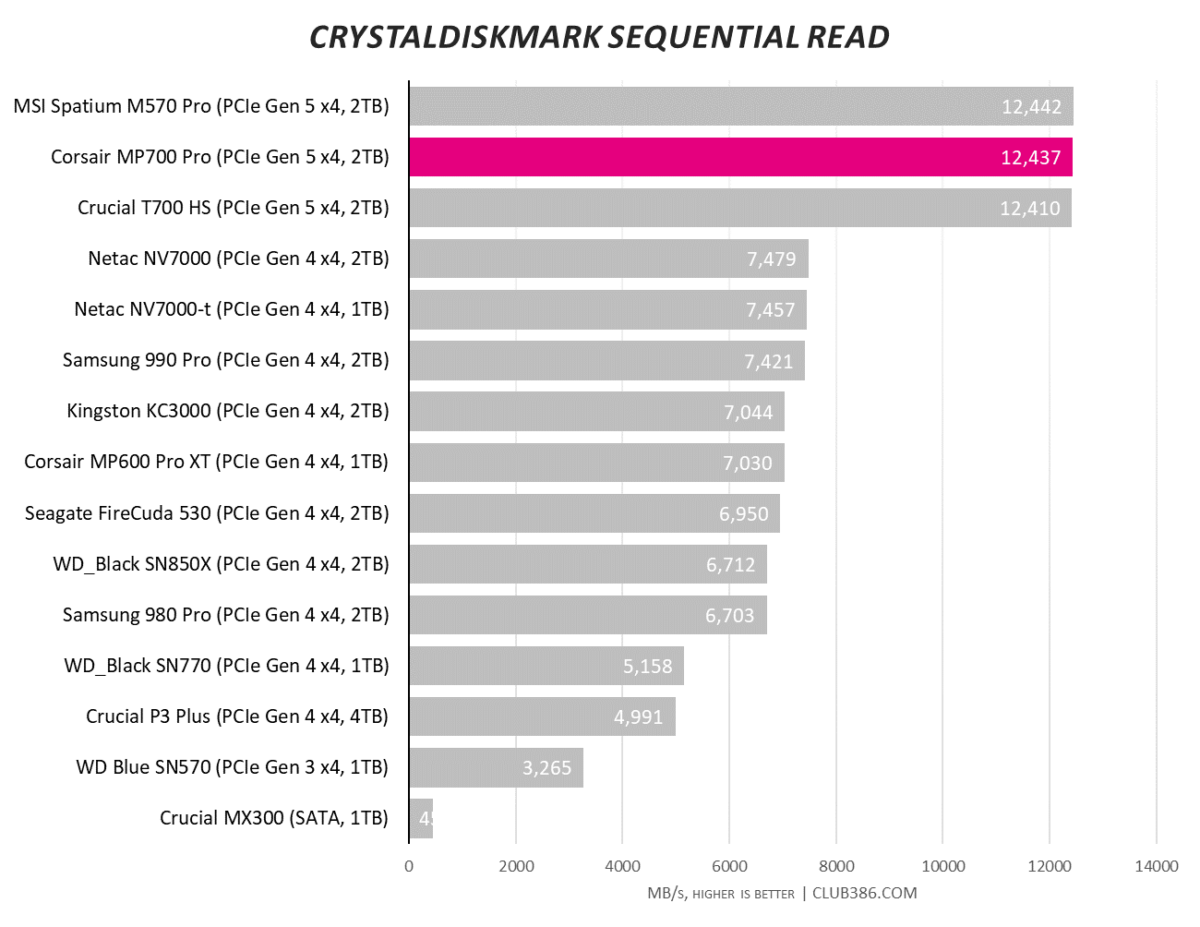
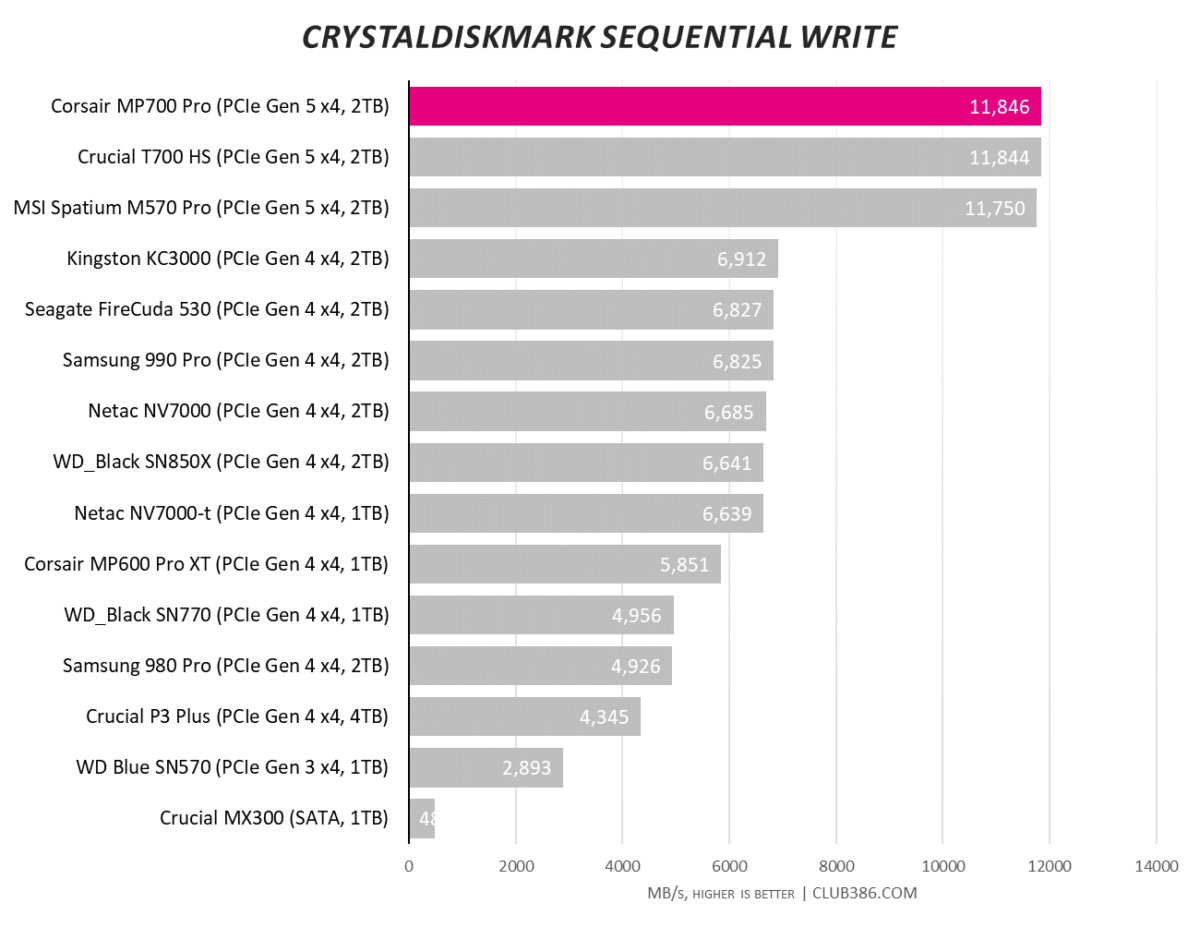
The trio of PCIe 5.0 drives stand head and shoulders above all others. As they should. Blistering speed for both sequential read and writes makes easy work of multi-GB files.
Performance stays robust on a regular PC for transfers up to 200GB or so. This makes sense as around one third of the capacity is reserved for SLC caching. As it has three times less density than TLC, I’d expect there to be a drop-off after this 200GB figure. This is exactly what happens, actually, as a straight-line 7.2GB/s drops to around 3GB/s thereafter. If you’re wondering why I don’t see 11GB/s-plus, the low-thread nature of the benchmark inhibits peak performance.
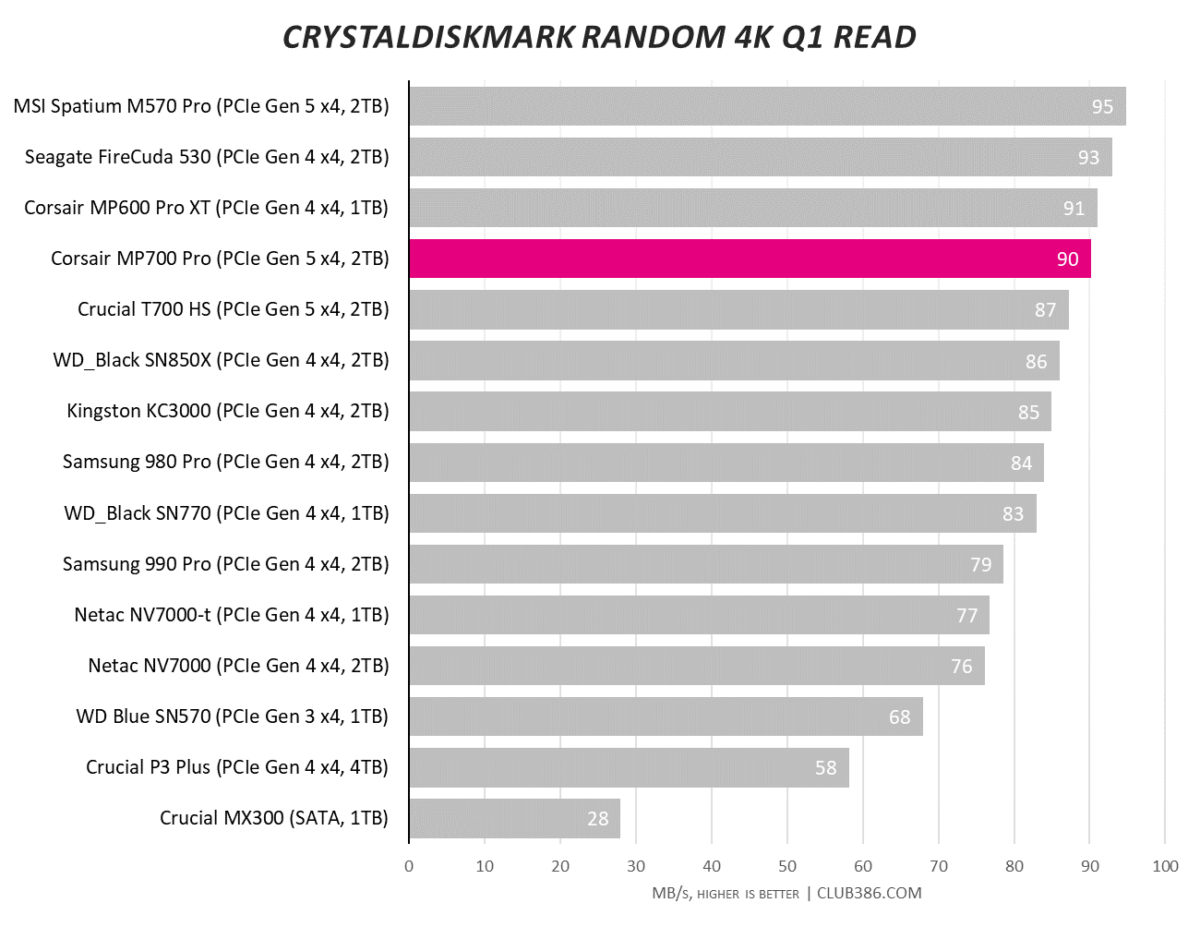
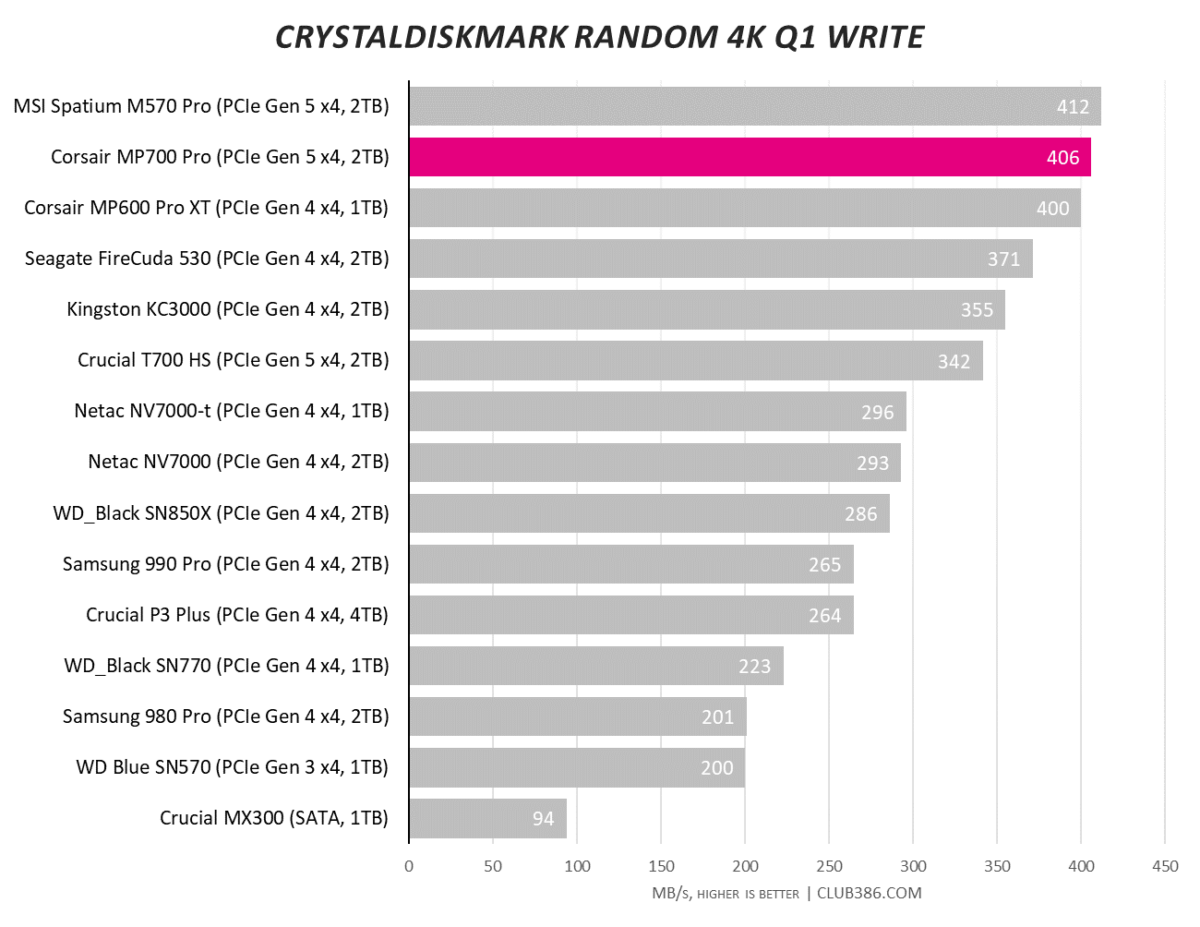
Pretty good at random access, as well.
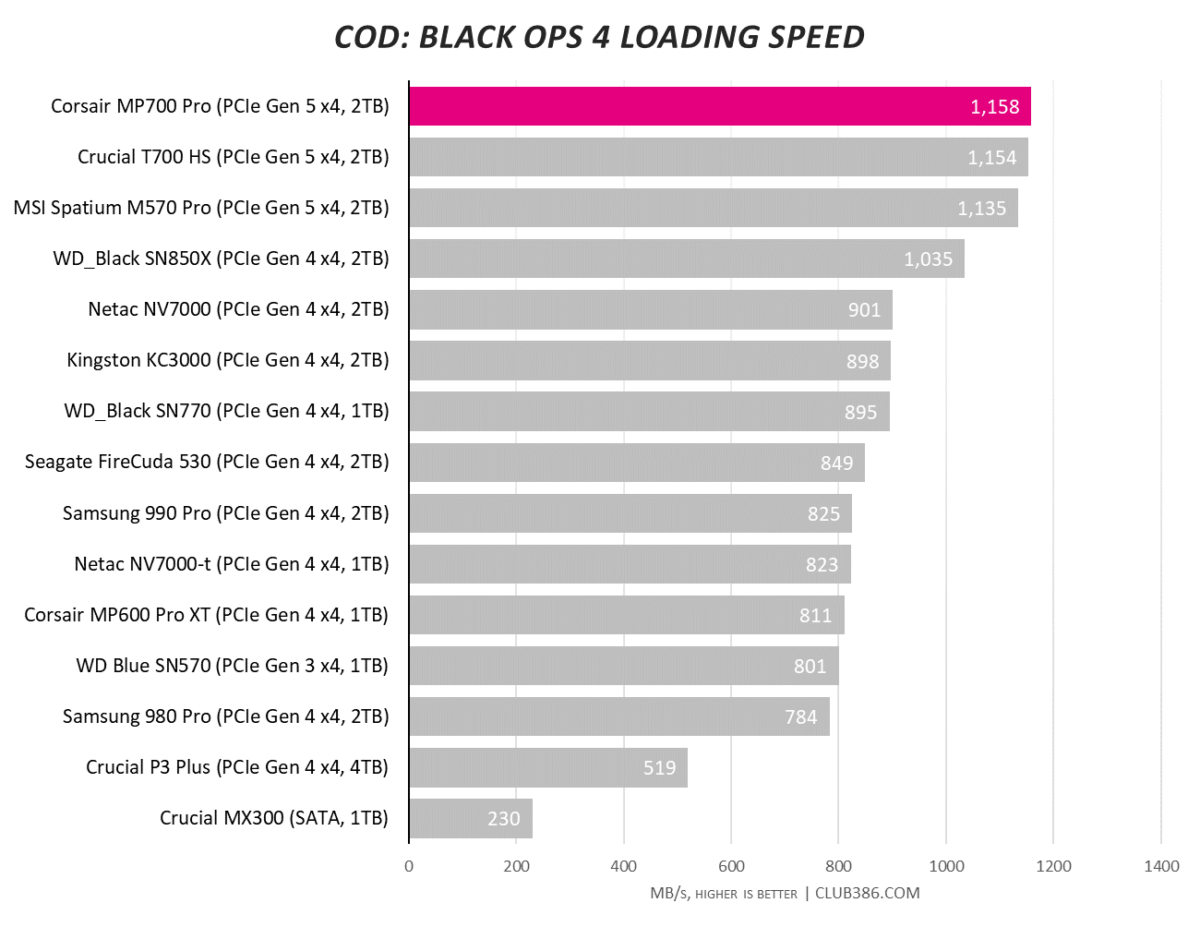
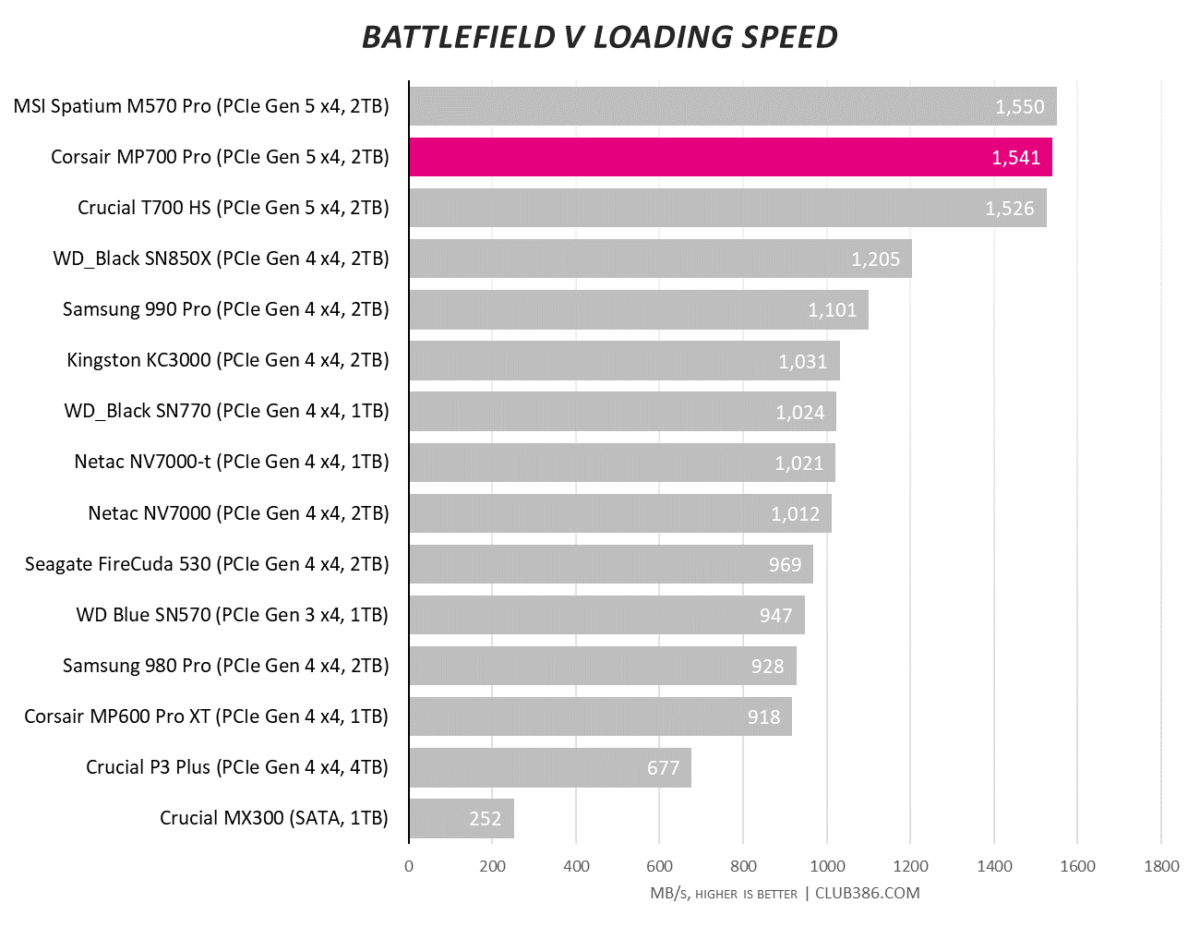
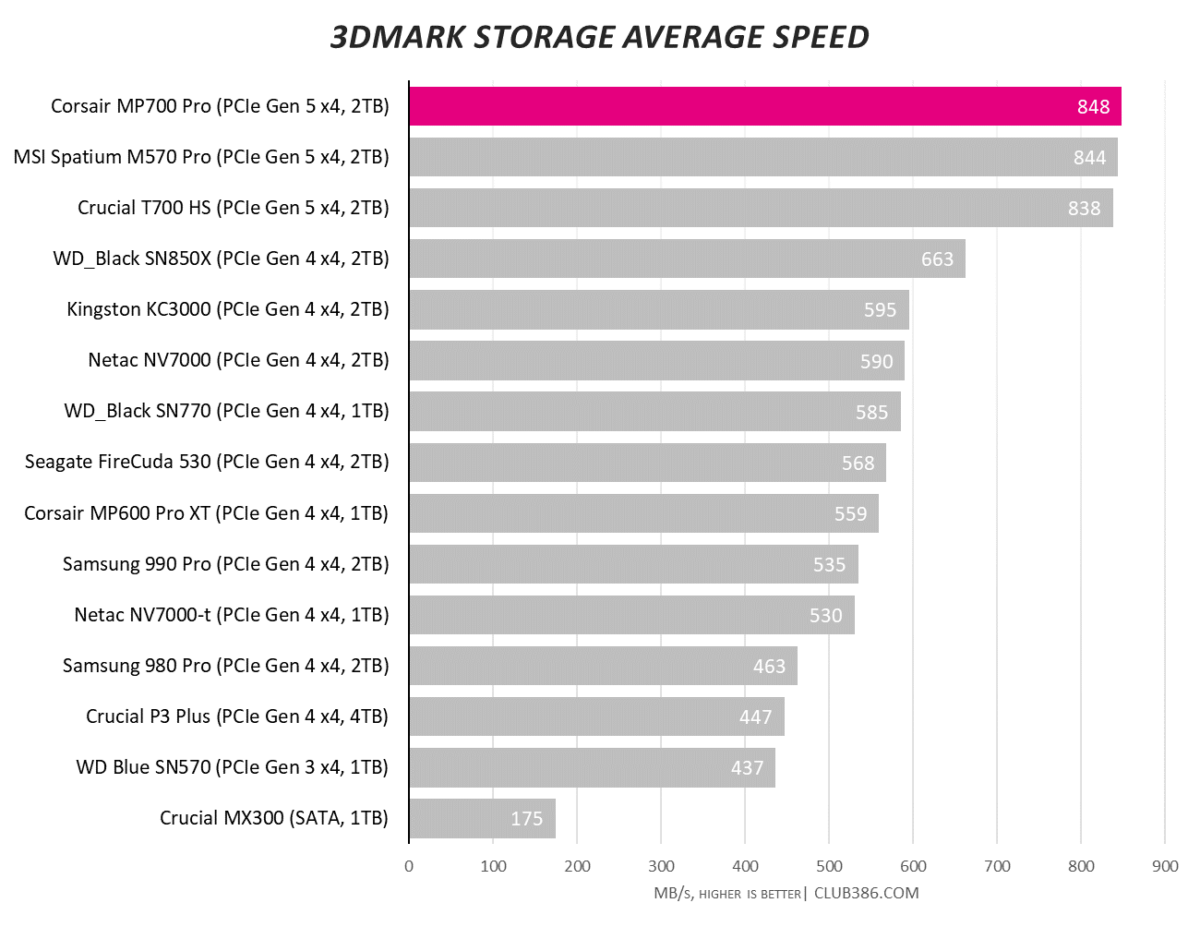
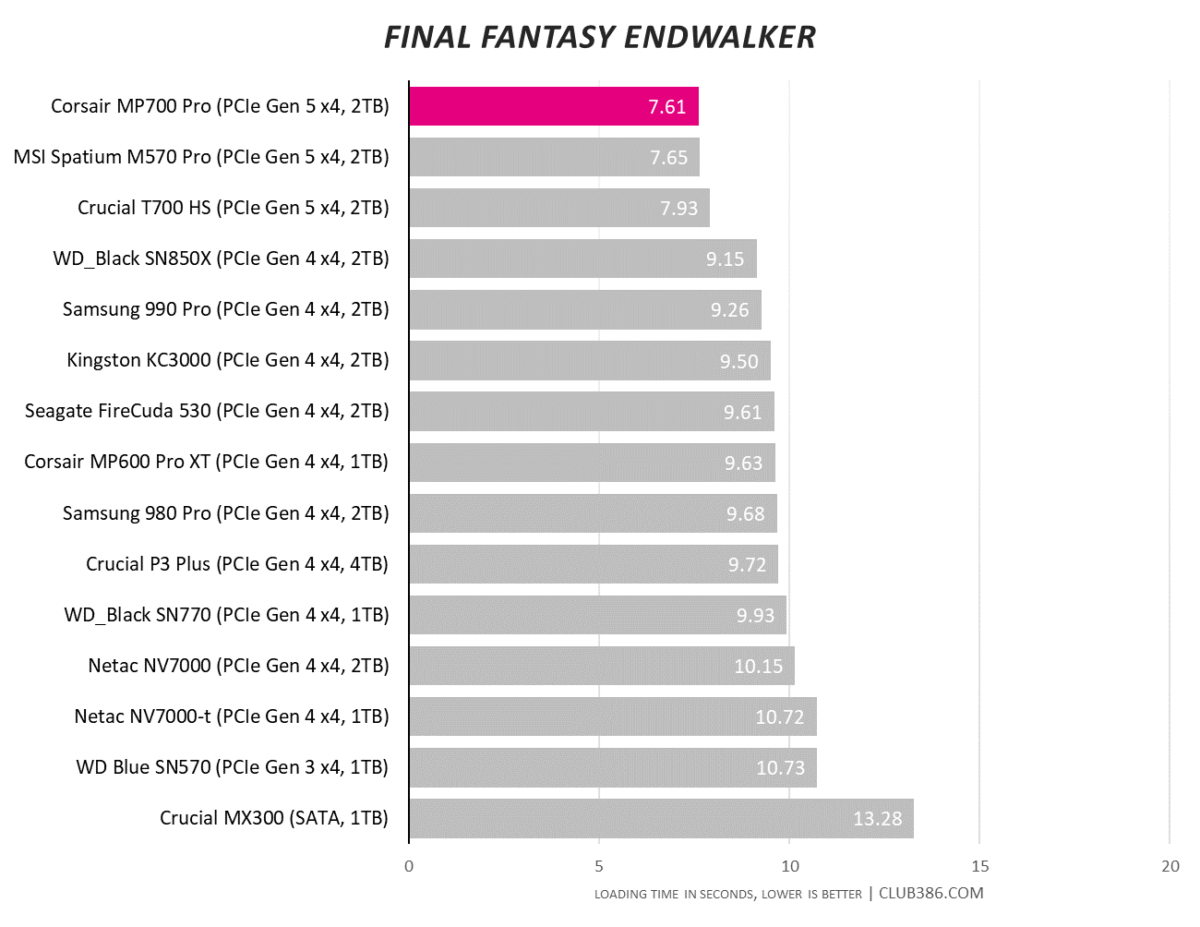
You’d expect to be playing plenty of games if you have a drive like this. Expect top-notch performance from the Corsair MP700 Pro 2TB.
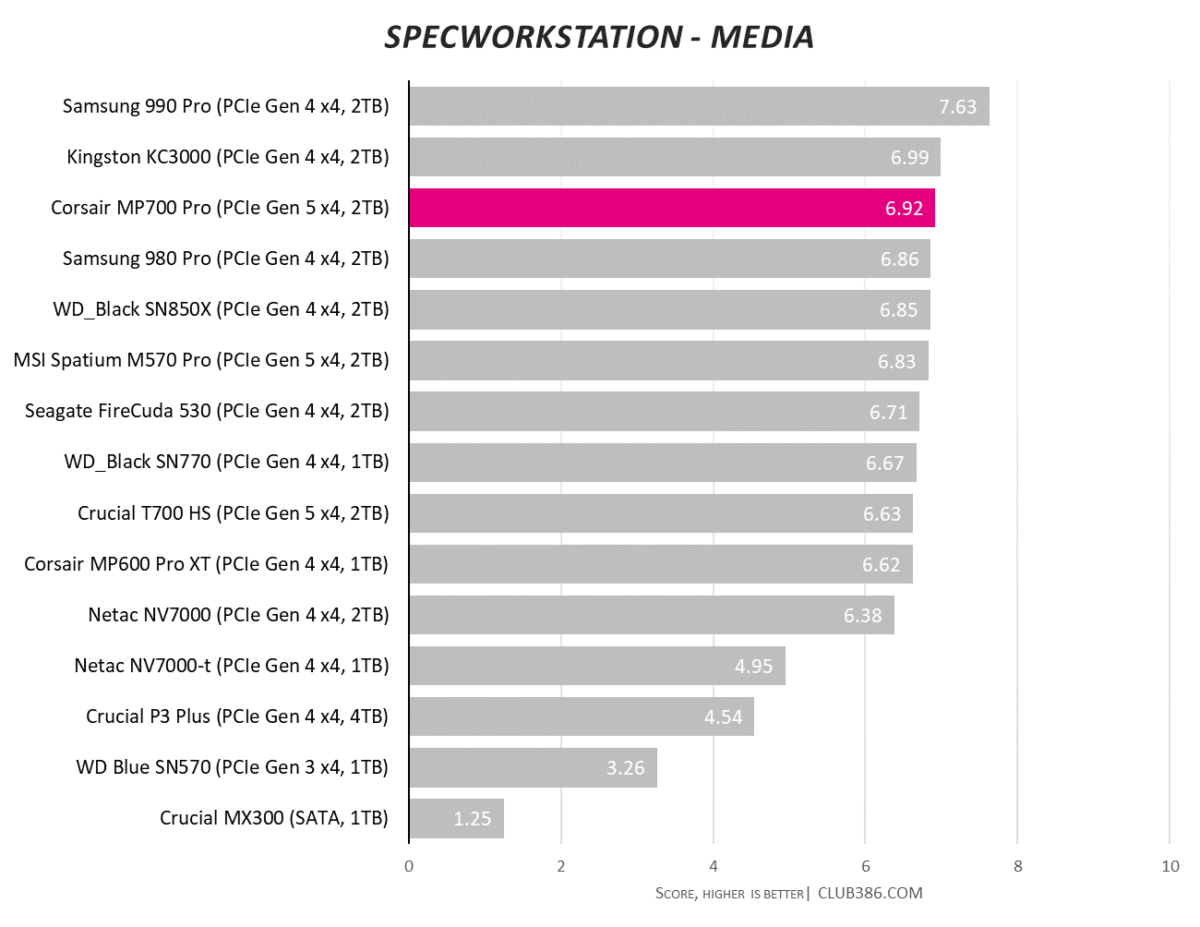
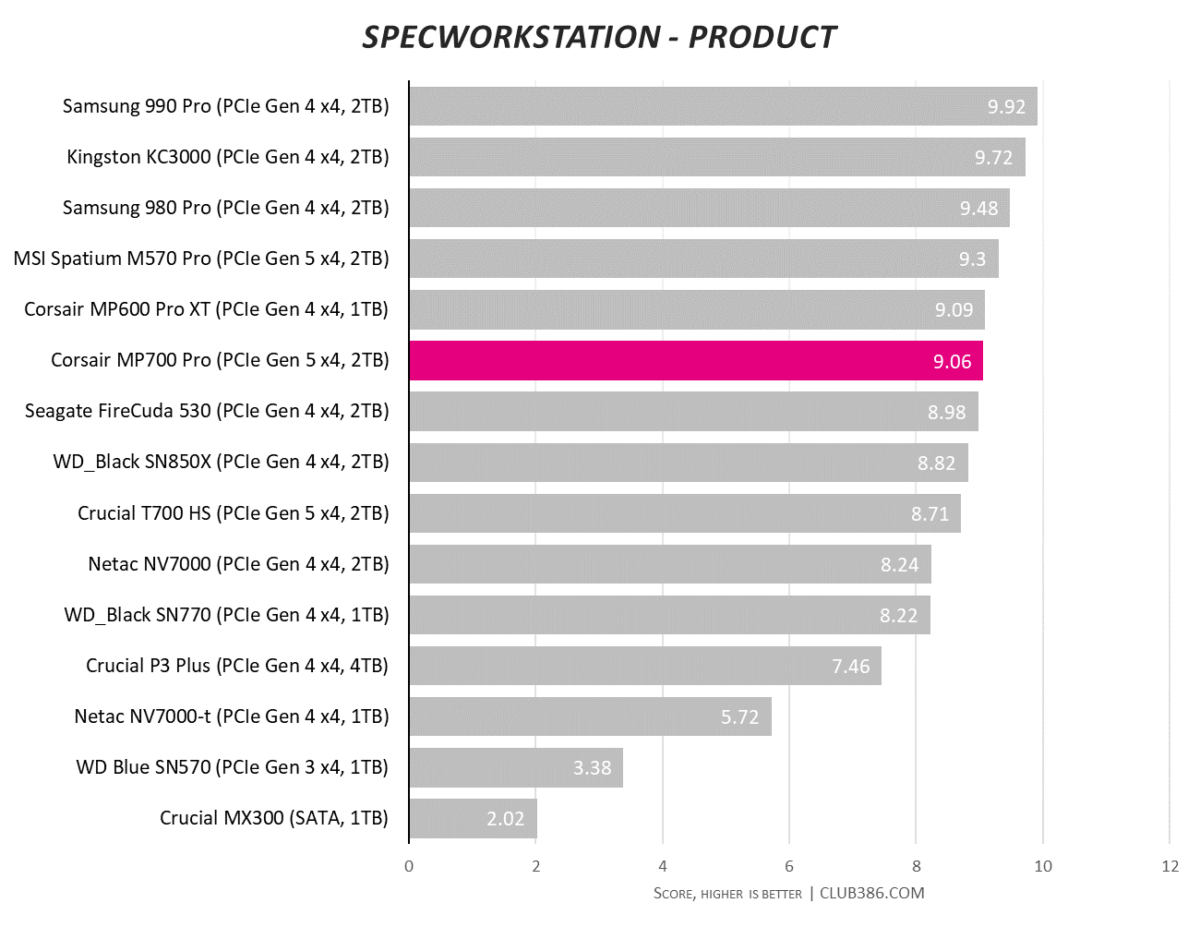
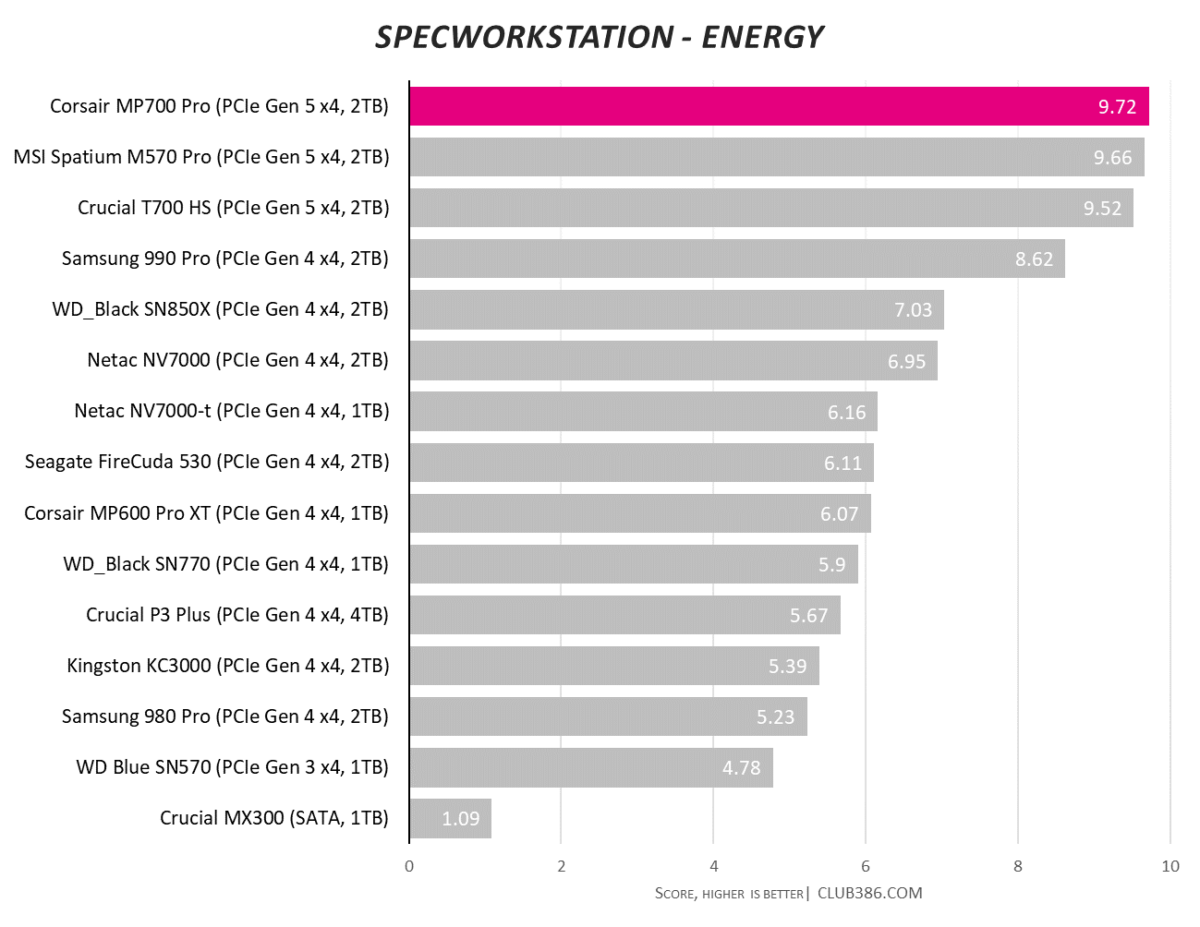
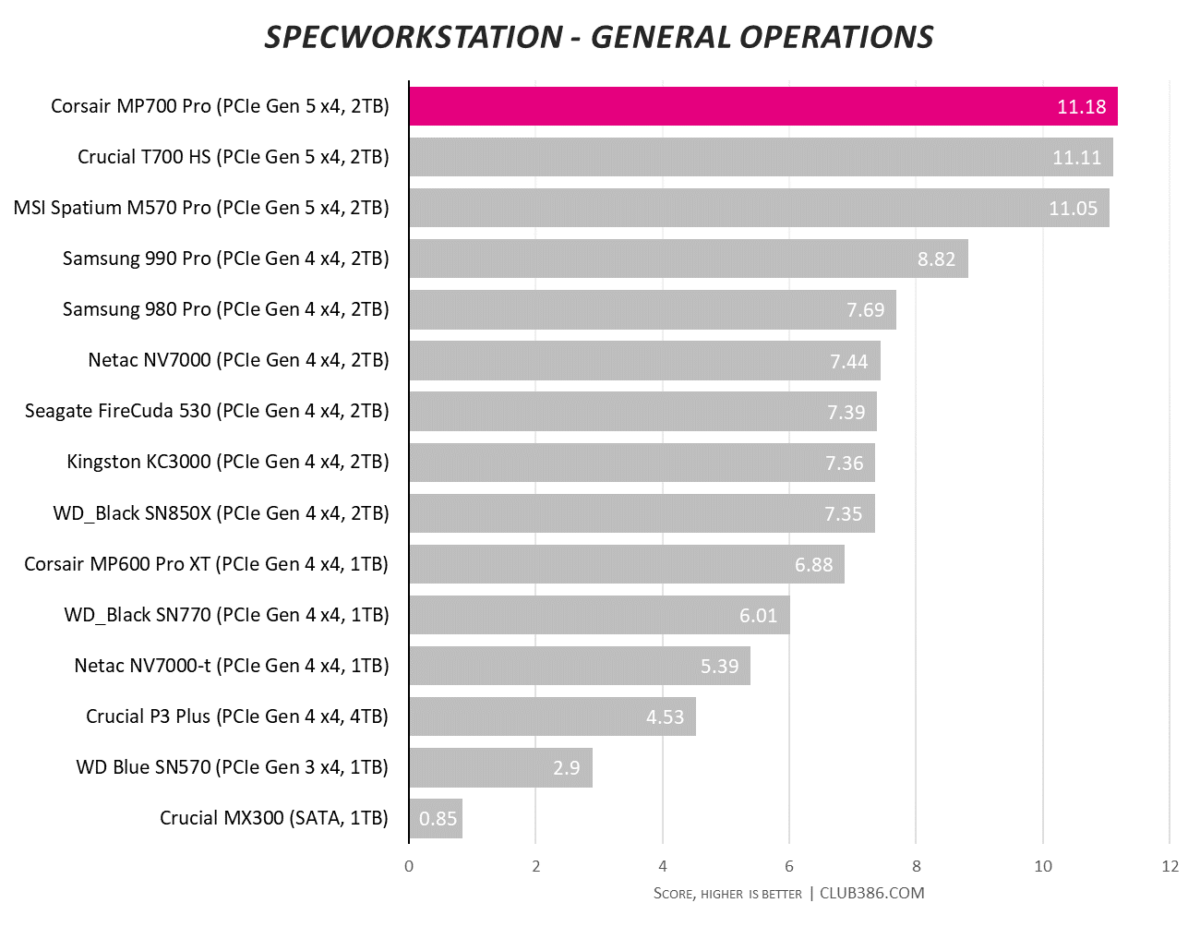
Shifting over to professional applications, which oftentimes separate great SSDs from the merely good, Corsair continues an enviable performance run.
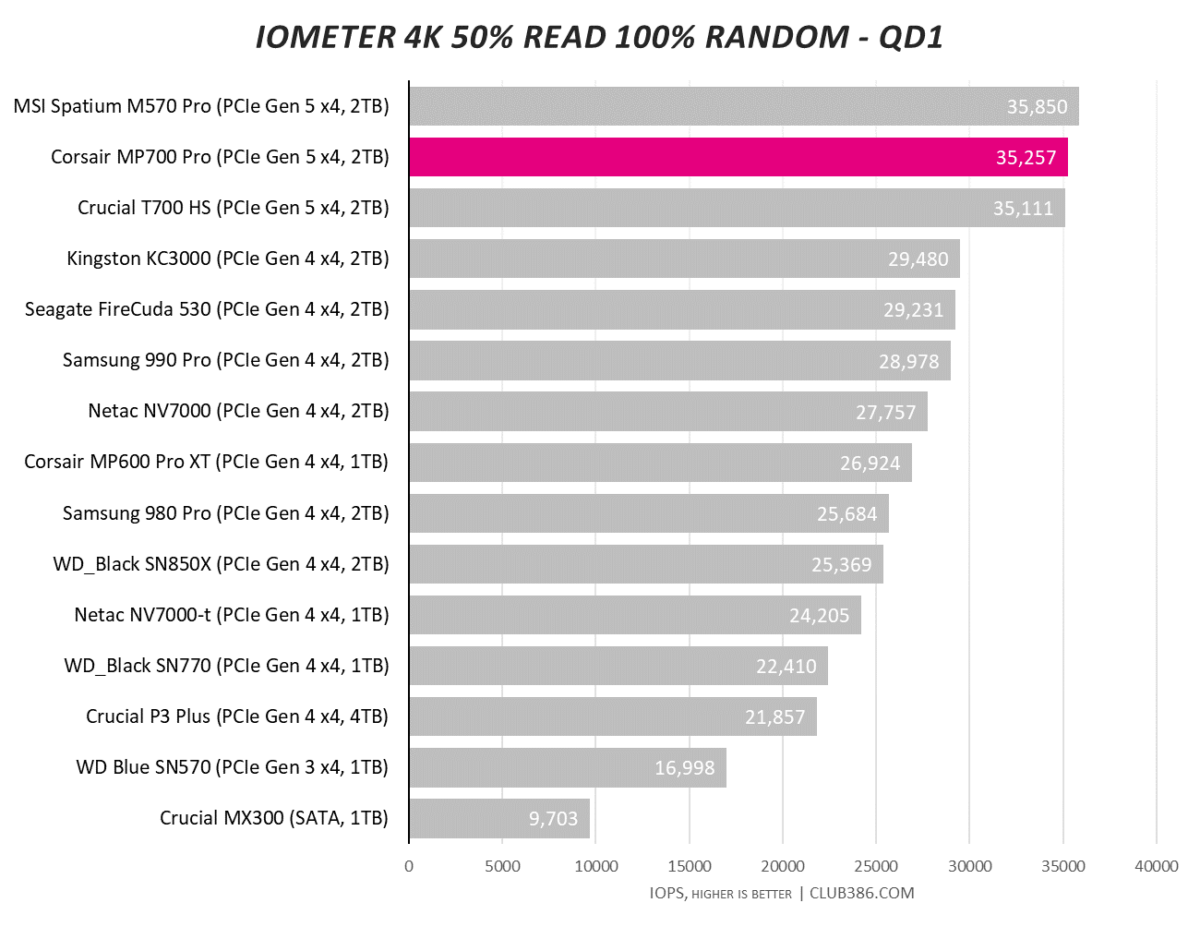
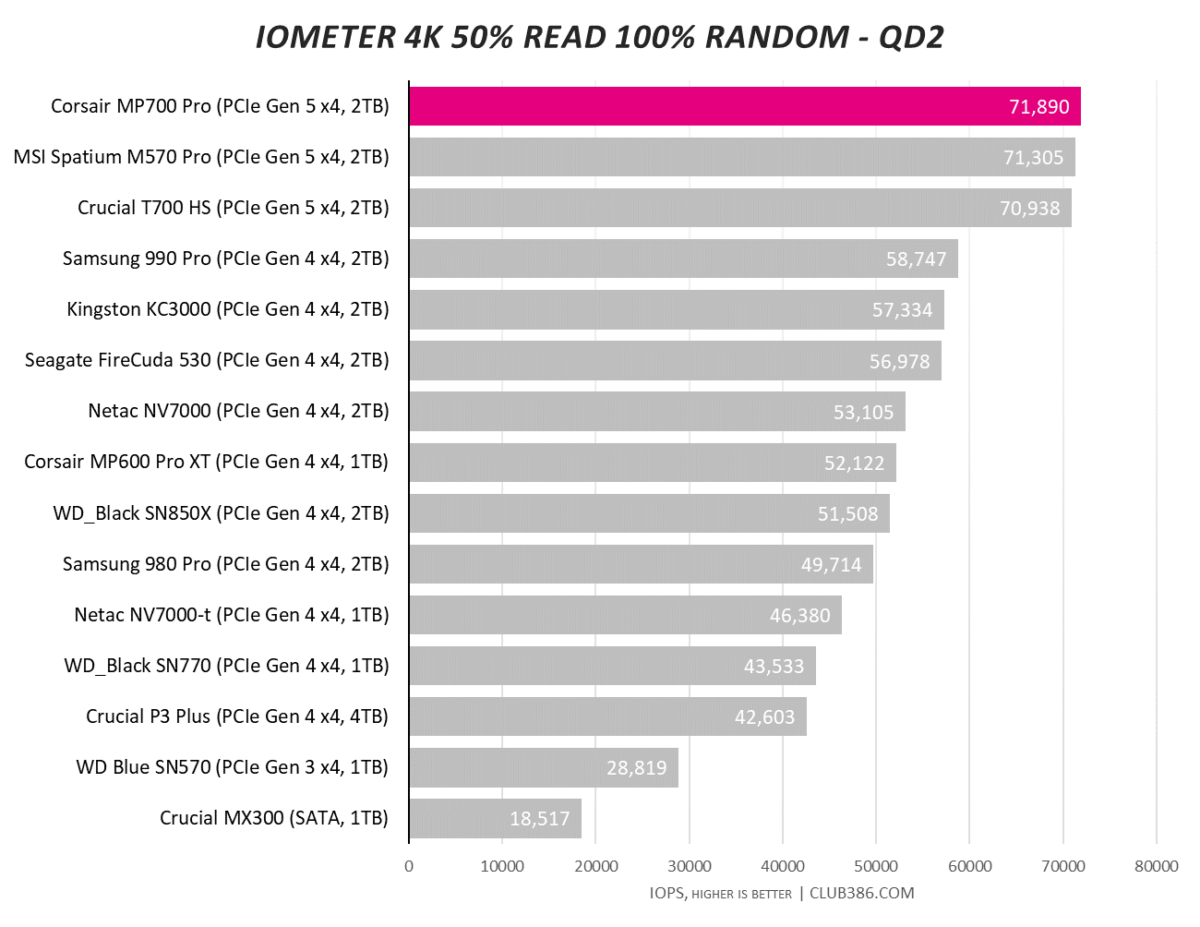
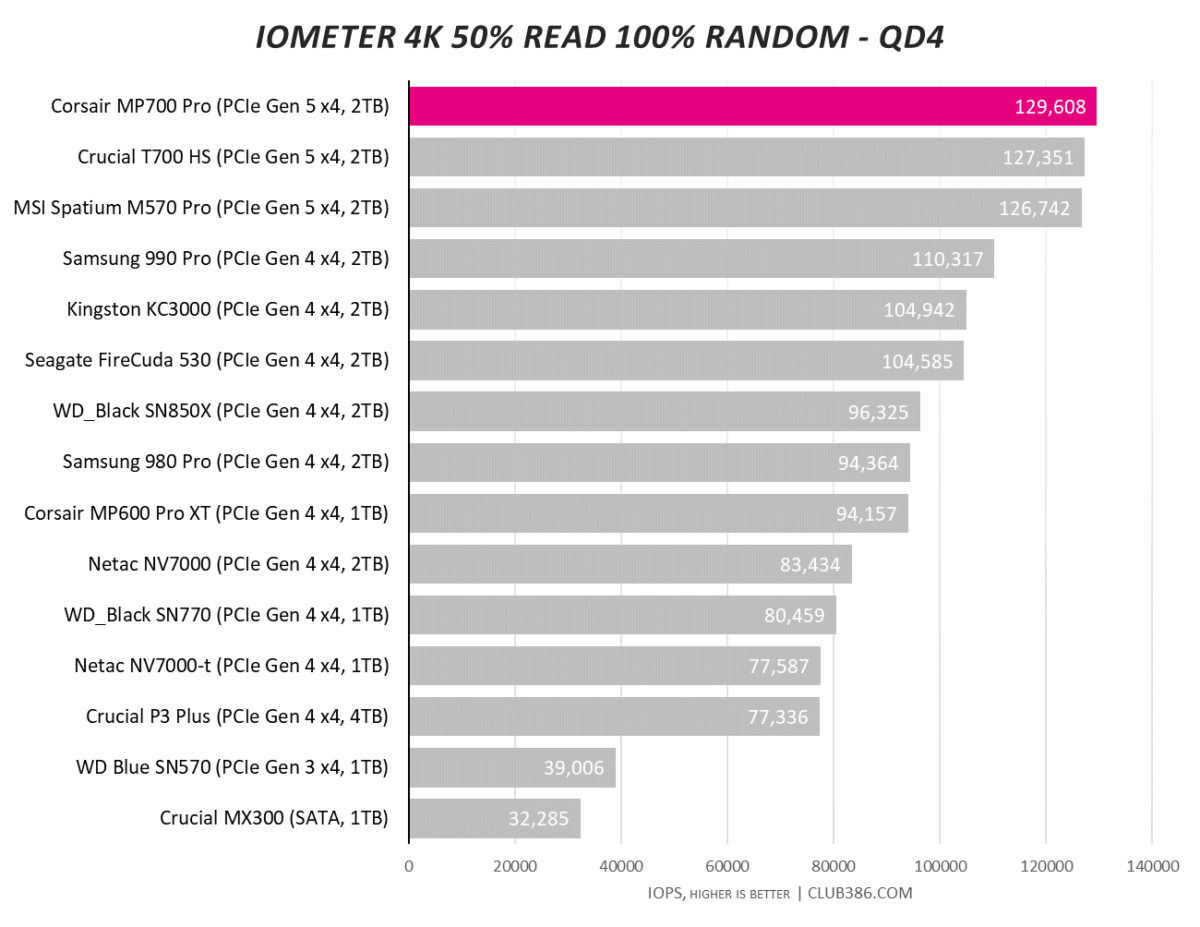
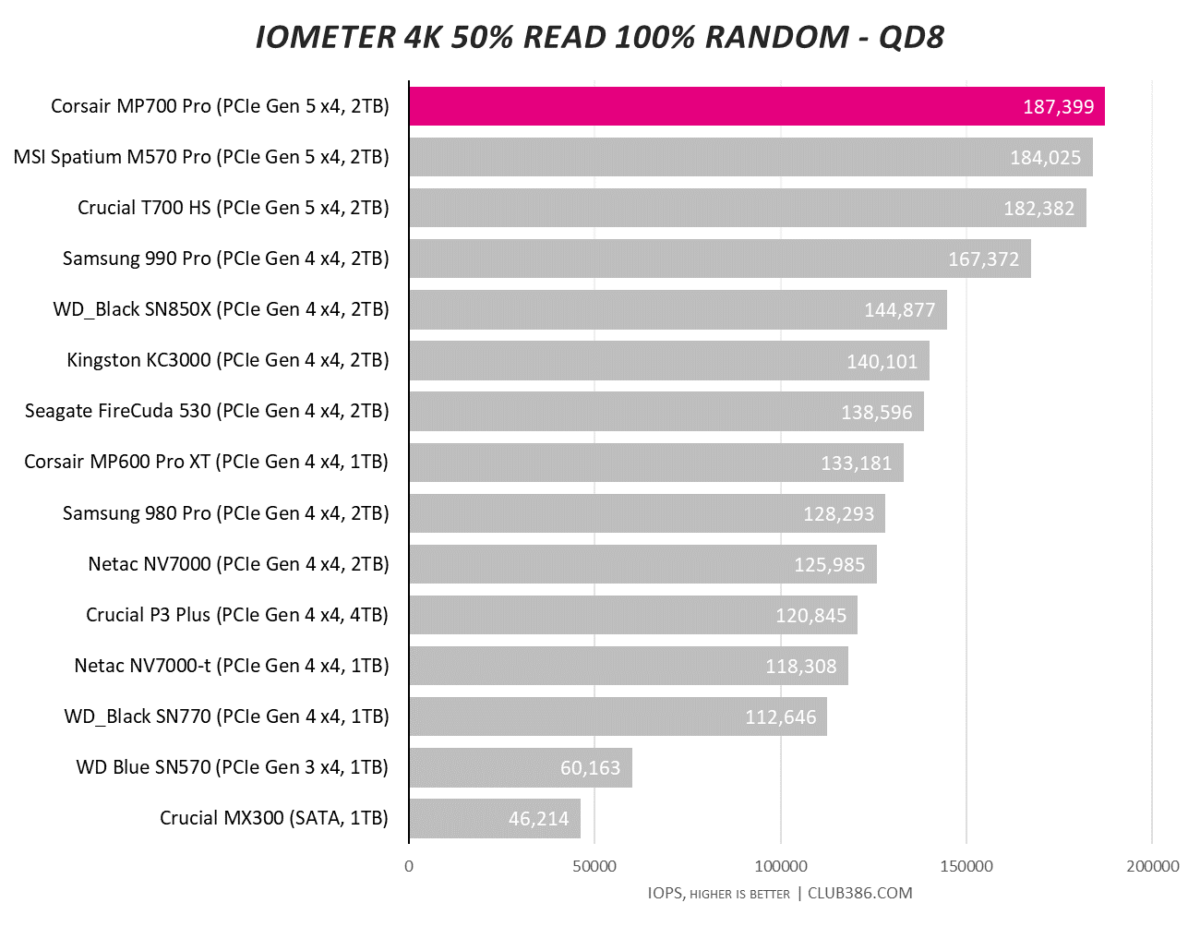
I like Iometer as it really gets underneath the controller and NAND’s ability to push out data. Increasing the queue depth is indicative of more strenuous loads. Putting it into context, you’re looking at 50% more throughput than a decent PCIe 4.0 SSD.
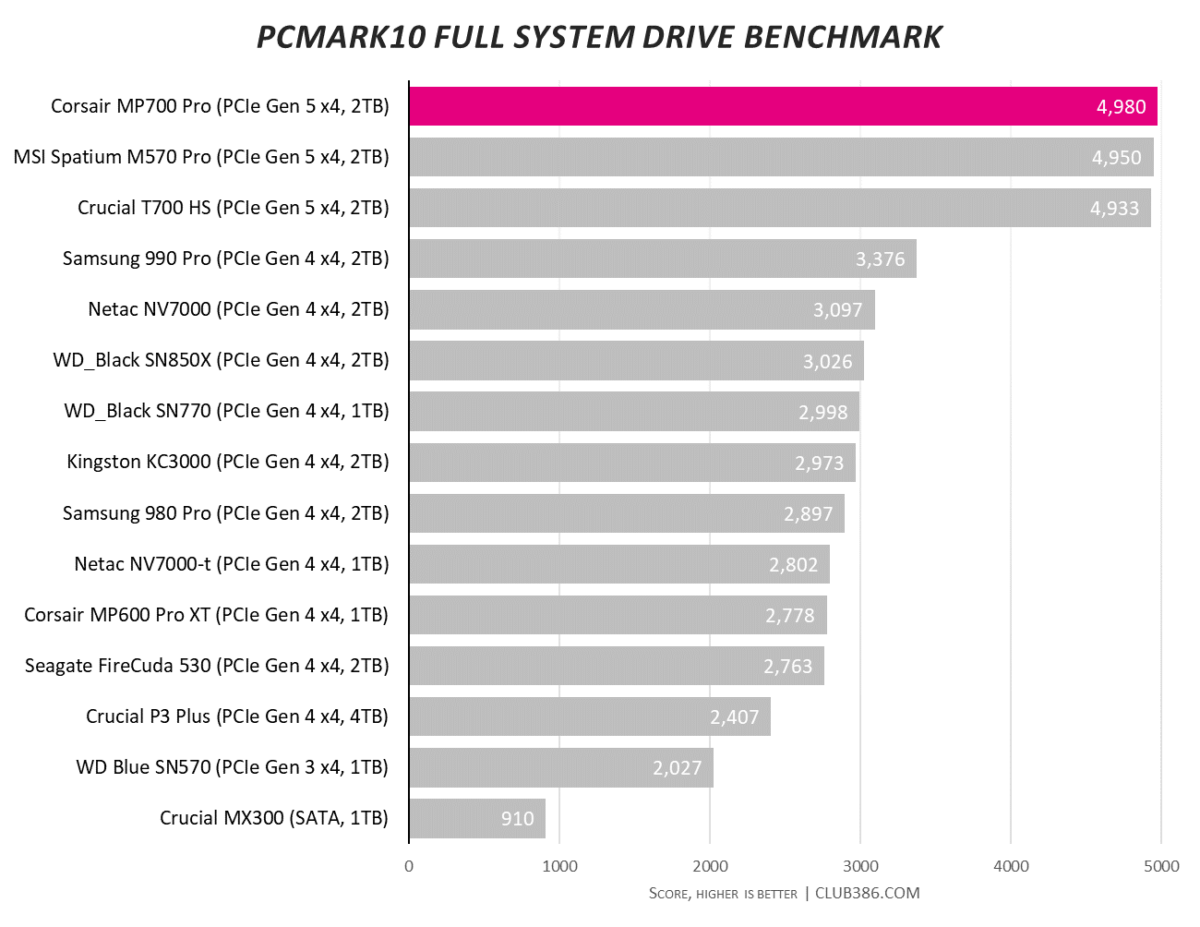
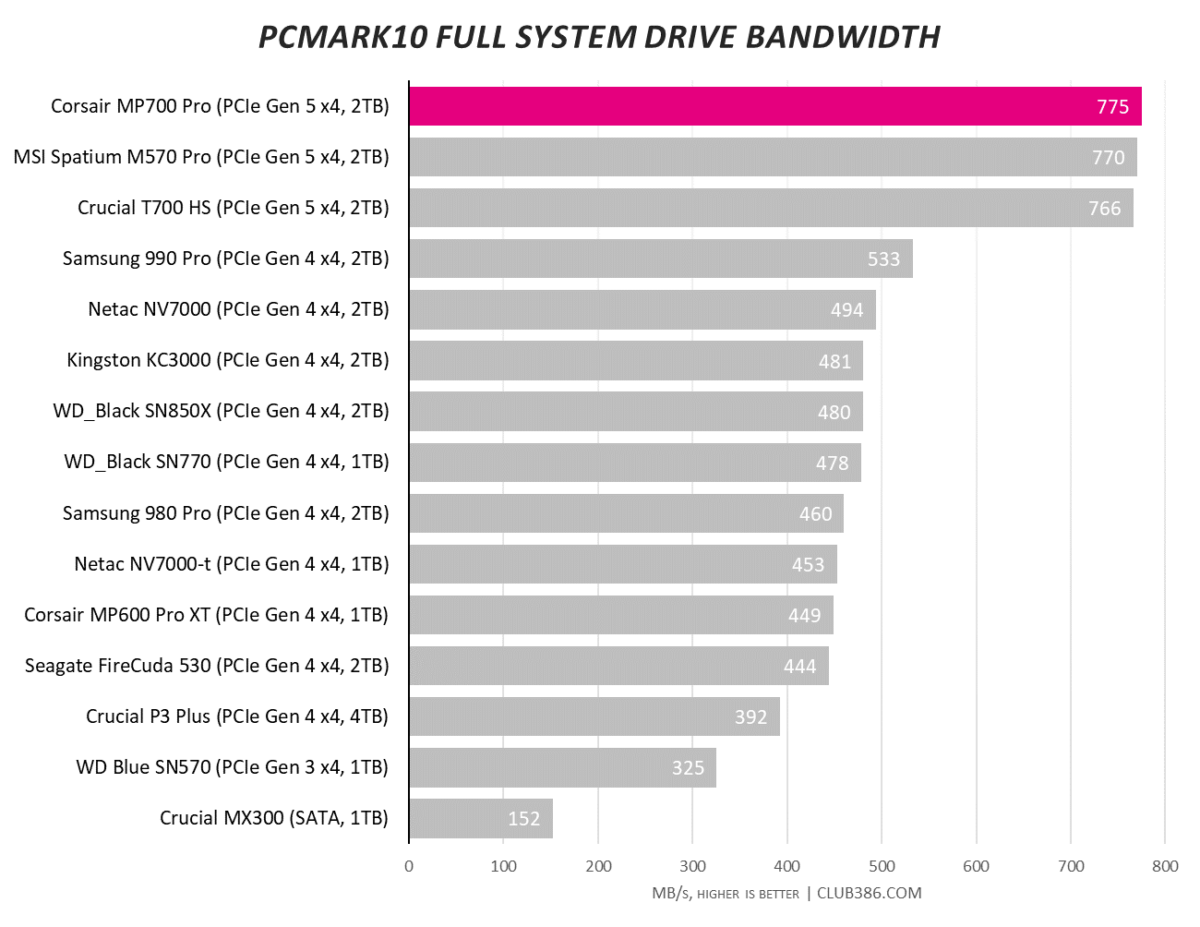
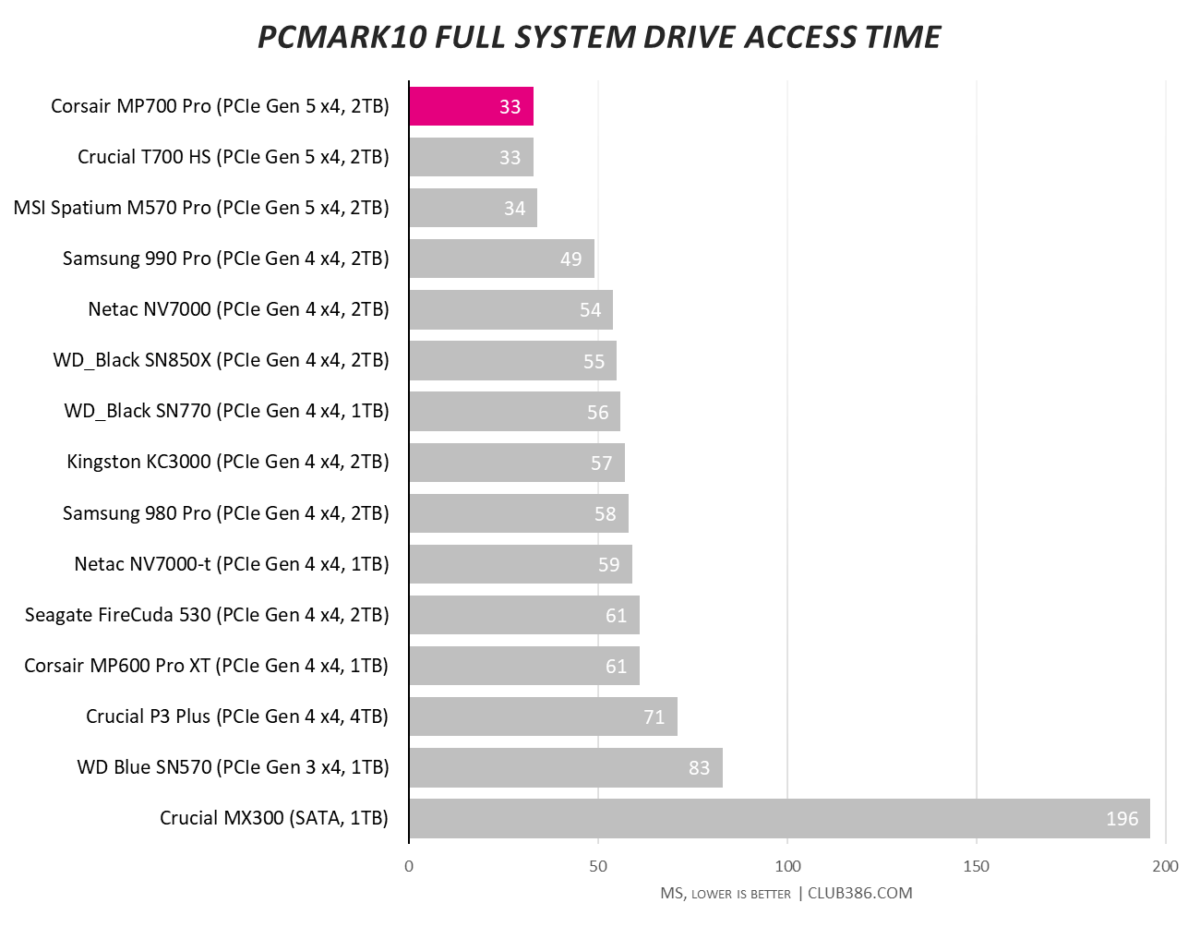
Saving the hardest tests for last, PCIe 5.0 x4 M.2 SSDs are a great home for a high-end PC, if you can stomach the cost.
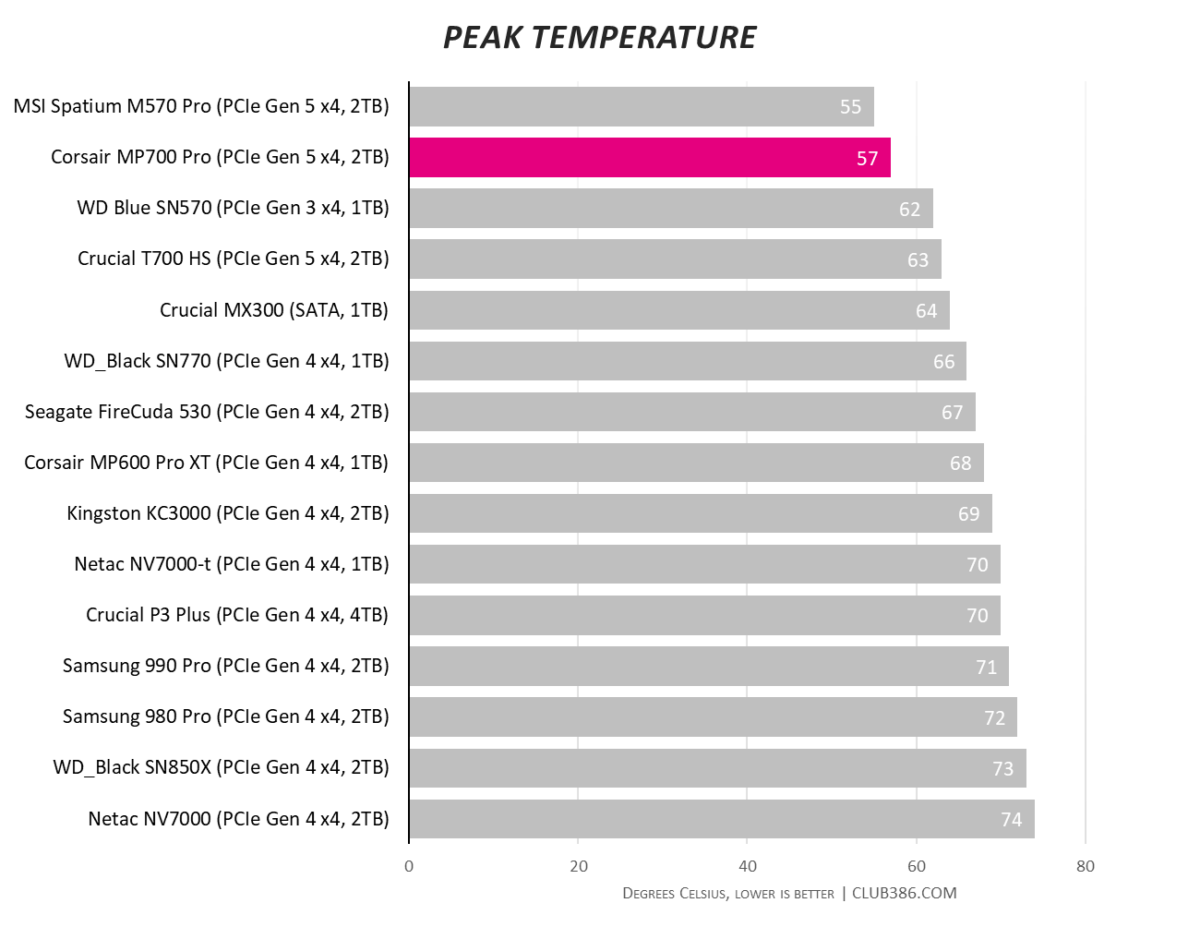
Excellent under-load temperature belies a different truth. The drive starts off at around 40°C. It takes over 10 minutes of constant small-file random writes to achieve the 57°C figure. Top marks to Corsair for ensuring heat is never an issue.
Underscoring this thinking, I didn’t come across a single instance of the drive thermally throttling. Nor should I, to be fair, as the firmware kicks in heat protection at a much higher 76°C. It’s actually tempting to disengage the SATA cable and run completely passively.
Conclusion
Corsair easily steps up to the performance plate with the MP700 Pro SSD. Available in three distinct flavours to suit every PC, performance is predictably impressive from the adoption of Phison and Micron technology. At or near the top of most benchmarks, I have no trouble recommending the drive to enthusiasts who want cutting-edge hardware in every part of their system.
The use of an integrated fan is divisive insofar it adds an element of noise. This is an inevitable trade-off for going with PCIe 5.0 and a small-ish heatsink. Corsair chooses this route over a much larger passive heatsink, and both have merit. I don’t have a problem with either. If you have other fans in the system, chances are the tiny 20mm spinner is drowned out by larger fans.
Overall, enthusiasts who are already invested in the Corsair ecosystem and want a super-speedy SSD need to look no further. There’s enough going for the MP700 Pro to bulldoze its way into our next best SSD guide.
Verdict: a well-engineered SSD that ticks most of the right boxes.

